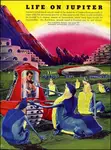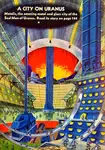- Home
- >
time travel and reality change
Potentially the most catastrophic invention of all - er - time, Time Travel could wipe out the cultures of the Solar System. Think of the reality changes which might be caused by chronological meddling...
Harlei: But on the other hand, Time Travel might have enabled the Solar System. As it turns out at the end of The Weapon Shops of Isher.
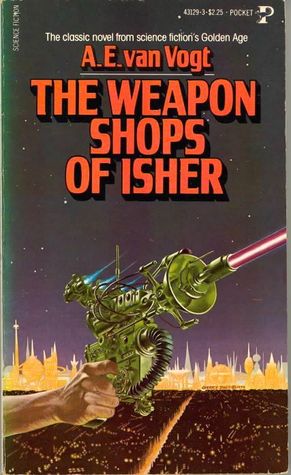
Stid: I remember - the explosion that assisted in the formation of the planets... and on a smaller but still important scale, in Routine Exercise, the stranding of our ancestors in the remote past.
In such scenarios, we owe our existence to Time Travel.
But hang on a moment, shouldn't we take Zendexor to task here? Isn't he guilty of mis-representation? This is supposed to be an Old Solar System site yet here we are discussing a topic, of which the literature can hardly be said to extend beyond alternate Earths...
Harlei: No, you're being too hard on him. He had his valid reasons for starting us on this topic, you can be sure. For example: I bet there are loads of journeys into the far future which involve the Solar System. Think of Night, for example...
repeated brushes
Stid: But travel into the future is hardly to be distinguished from suspended animation, at least in its effects. Real time-travel is travel into the past, or arrival of future people into our present. Going against the time-current. That's the real stuff, the supremely dangerous challenge! Reality-risking - that's what this page has to be about - eh, Zendexor?
Zendexor: You're right, and I shall justify its presence on this OSS website as follows:
First, I admit it is bound to be mostly about Earth. But Earth is entitled to the privilege provided we think of it as in a sense "the king planet". Think of it not by itself but as holding court among the worlds...
Yes, not Jupiter but Earth is the king planet in the sense of bulging with recursive layers of culture and history. And those extra coats are laid on by repeated brushes of Time-Travel.
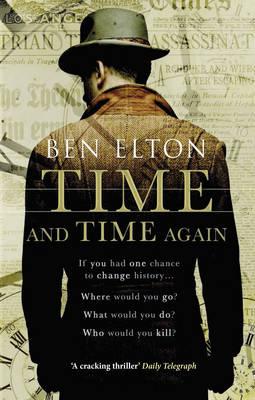
Stid: What you're saying is: each member of the Sun's family of planets has one fictional culture layer except that (thanks to Time-Travel) Earth has several. Hence in order to give Earth her special due, we have this page. Well, all right. Here's to the King Planet! But - "uneasy lies the head that wears the crown". I fear that the solidity of Earth's existential fabric might be compromised by too much shimmering fluctuation of realities, caused by one wipe-out after another, at the hands of time-travellers who cannot leave well alone... like the meddlers in Time and Time Again and in 11.22.63, who wish to prevent the Great War and John F Kennedy's assassination, respectively.
Zendexor: We can hope that time-travel will never be invented; indeed, it seems likely it won't ever be, because, otherwise, where are the time-travellers? The crowds of sightseers from the future? But if (Heaven forbid) it ever is invented, those two brilliant books you mentioned should be required reading for policy makers.
Here indeed, the sheer greatness of science-fiction blazes forth. I mean to say, we have a thing - time-travel - which may never happen, yet the authors' minds are ready to tackle it, to think out the implications of it, to intuit the almost indescribable "thinning" of the over-trodden carpet of reality which may ensue. Leaps of the imagination which all add to the shimmer of the king planet, Earth.
Stid: Or more like a paint-stripper that wipes it all out, if the operation goes wrong...
dead pockets
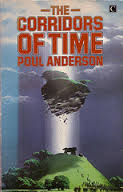
Harlei: Authors have thought of that, you know. Some of them assume an inertia to events, so that it is hard to change the essentials of history, though one can tinker with the details and alter the interpretation of them, like in The Corridors of Time. Or the traveller can go so far back that nothing he does will affect the present - as in The Moon Era.
Or - another idea - there might be "dead pockets" of Time, areas of history which are somehow stagnant as far as causation is concerned. Such "pockets" are lacking in influence on other eras, so you can visit them without fear that your actions there will alter subsequent history. I'm thinking now of The Forgetters.
Zendexor: There you are, Stid, it's not just Earth; time-travel has been known to involve the Moon and Uranus too.
patrol mishaps
Stid: I grant you that, but despite the points Harlei has made, I have serious doubts about the security of any operation involving Time.
You, Harlei, mention the stabilizing "inertia" of history's main current, in The Corridors of Time. But in the same author's Guardians of Time we have the story Delenda Est in which there's a whacking great emergency: all of a sudden, members of the Time Patrol find themselves amid a babble of different cultural impressions and they realize (this is grippingly handled) that history has been deviated thoroughly from its course. In fact, it turns out that someone has fixed it so that Hannibal won his war against Rome, causing all subsequent history to take a new path.
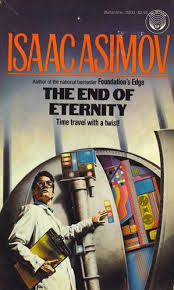
Harlei: It's put right, though.
Stid: But next time it might not be! And what about the other patrol organization, the one in The End of Eternity - what about the people who flicker in and out of existence while their history is tampered with in a seemingly endless succession of social-engineering Reality Changes?
Harlei: That's brought to an end, though - see the title of the novel.
Stid: Hmm... but the wiped out are wiped out, forever. Untold millions. And all their eras of achievement. Replaced... by us.
Harlei: Whereas in The Paradox Men it's the other way round - in the great one-off reality change, we're replaced. By something better.
Stid: I concede that The Paradox Men makes a good case for the wipe-out. Its replacement-reality is a clear improvement. But usually, I agree with Zendexor: the thought of wholesale reality-change gives me the shivers.
Incidentally, since this site is supposed to be about the Solar System, I'd like to mention that The End of Eternity makes an interesting point about space travel. Time Travel seems to have a hampering effect on Space Travel. As though a plot can't bear the weight of both.
inflexible futures
Zendexor: Let me step in here. There's the excellent tale Hindsight, a classic involving space travel and time travel, in the Old Solar System. Perfect for this page. A rather short tale but full of movement and unforgettable drama. You may call it fatalistic, but bear in mind that the following assurance is spoken by a man in the power of a tyrant - a tyrant who had demanded that the past be changed for his own advantage:
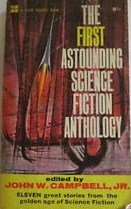 contains the story Hindsight
contains the story Hindsight"I failed to take account of the two-way nature of time. But the future, I see now, is as real as the past. Aside from the direction of entropy change and the flow of consciousness, future and past cannot be distinguished.
"The future determines the past, as much as the past does the future. It is possible to trace out the determiner factors, and even, with sufficient power, to cause a local deflection of the geodesics. But world lines are fixed in the future, as rigidly as in the past. However the factors are rearranged, the end result will always be the same."
The Astrarch's waxen face was ruthless. "Then, Veronar, you are doomed."
Slowly, Brek smiled. "Don't call me Veronar," he said softly. "I remembered, just in time, that I am William Webster, Earthman. You can kill me in any way you please. But the defeat of the Astrarchy and the new freedom of Earth are fixed in time - forever."
Stid: That tale is evidently at the deterministic end of the spectrum...
Harlei: But it's full of life, character, colour, movement. Never mind what it says about the future being fixed - the vividness of the action belies that, emotionally.
chronotic empire
Zendexor: Stid wants his emotions and his ideas to dovetail... and you, Harlei, appreciate (as you've just hinted) colour and movement more strongly than consistency. Well, you ought both to be satisfied with the great time-travel masterpiece of masterpieces, the book I'm going to mention next.
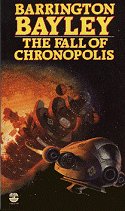
In it, armed Time Fleets battle for world supremacy, and wipe out each other's realities with reckless abandon, but the Chronotic Empire preserves records of its expunged realities in the Achronal Archives...
Stid: Don't give me that. What makes the Archives themselves immune to reality change?
Zendexor: I'm coming to that. You'll have to be more circumspect with your objections, Stid, because now we really are discussing the big stuff. The author of The Fall of Chronopolis has thought of everything. For once, we have a time-epic in which the paradoxes are explored properly. The nuts and bolts of it are all worked out with more ingenuity and vision than anyone else has shown.
The temporal substratum, or "strat", is the ocean of potentiality on which our reality floats as a kind of surface layer. Put that way, it sounds like it must be a mere metaphor, and yet the sailors of His Chronotic Majesty's Time Fleet know enough to be terrified of "falling into the strat". And if you're the Captain of a disabled ship that is disintegrating amid the time stream, that is just too bad...
"Leave me here, Lieutenant. Continue... do what you can."
Krish took his arm again, but Aton drew away.
"You must let me help you, sir. There may be only seconds - "
"Surely you realize that I cannot leave the ship. Save yourself... and whomever else you can." Seeing Krish's indecision, his tone hardened. "That's an order, Lieutenant." He waved his pistol. "I have my own protection... against the strat."
"Yes, sir." Krish stiffened. He stepped back, clearly affected then snapped off a salute that Aton returned perfunctorily.
Then he turned on his heel and strode away.
Moments after he had gone the wavering ortho field deserted the stretch of corridor where Captain Aton was standing. The pistol, with which he had been meaning to shoot himself, dropped from his fingers. In a little over a second the field swayed back again, but in that second Aton saw it.
The strat. The temporal substratum.
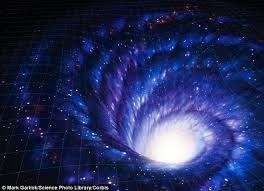
The Gulf of Potential Time.
It was only a glimpse, but even a glimpse is too much. Fortunately, or perhaps not so, the returning ortho field saved him - saved him, among other things, from remaining conscious, for exposure to the strat does not bring merciful oblivion. With the return of passing time the glimpse of eternity became a mental shock of pathological proportions. Aton instantly fell unconscious.
At almost the same time two noncom chronmen, running desperately for the life raft, saw their captain lying there in the corridor...
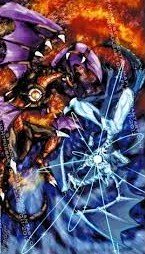
Later in the book we learn more of the strat, and of the pseudo-Life within it, including the malign potentiality called Hulmu who jerks and lashes in his hunger to become real... Even Lovecraft with his "crawling chaos Azathoth" couldn't match this.
And I haven't yet mentioned the "nodes" of time, wave-points of travelling consciousness, separated by more than a human lifetime, which provide something of a buffer against paradox; their sequence must be in a sense orthogonal to ordinary linear time, like the "physioyears" of The End of Eternity.
But despite the factors that make for coherence, paradox and reality-change are unavoidable. Reality has some momentum but if it is eroded beyond a certain point it gives way. This is the spooky aspect of the time war in The Fall of Chronopolis: when your past is expunged you don't disappear straightaway; you have maybe a few hours...
Commander Haight learns that the city of Gerread has been wiped from history:
...swallowed, foundering like a ship, by the infinity of non actual, merely potential time. That, at least, was how it was described technically. In church language it was the Gulf of Lost Souls.
...But the battle was not yet lost. There was still strat time, and in strat time events did not vanish, once having taken place, but lingered for hours, days, sometimes months of subjective personal time. Nothing was irreversible.
They might yet snatch back those lost souls from perdition.
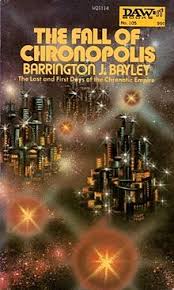
The fleet continued its traverse. This, Haight reminded himself, was but a preliminary exercise in how the coming time-war would be fought. Always the object would be to alter the adversary's history: reaching back and further back into the murky tale of mutated events, answering every move with a cancelling counter-move. And final victory would be achieved only when the history of one side was so completely distorted that the existential support for its fleets of timeships was removed. Even then they would continue to fight for a while, ghosts moving through the strat, never having been manufactured, manned by crews that had never been born. Then they would fade, sinking into nonactual, potential existence...
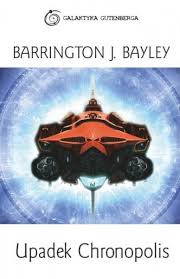
My reading of this book was an experience in which I underwent one start of recognition after another, as the rightness of each idea impressed itself on me. The critical mind can only surrender under such circumstances. Pick up this story and you are in the hands of a master. Feats of elucidation, of description and drama, for which one would have thought language to be woefully inadequate, are dealt with in a blinding clarity.
For instance, take those Achronal Archives which I mentioned earlier.
Here, in this subterranean cluster of vaults and bunkers, could be found a refuge from Chronotic instability.
The Achronal Archives were, in essence, a record of deleted time. Whenever an event was altered - whether by natural causes, or by order of the Historical Office, or by act of war - the consequences spread up and down historical time making the adjustment complete in all directions. Only the existence of the archives made such changes detectable. Protected by powerful time-buffers, the vaults were impenetrable to the powerful rectifying vibrations that echoed through the strat. Thus the records that were kept on every facet of the empire remained intact and could be compared with time as it currently stood.
It was a record of ghosts. Millions of men, women and children, entire cities, nations, and cultures, that now had never existed, were stored in the archival computers....
Stid: You would say, then, that this is the summit, the acme of time-travel literature?
Zendexor: I think so, and that is why I would end the page here, but for a related topic, that of reality-change. I haven't yet finished with that.
usurping id
Stid: But surely you have. Reality-change is so closely connected with time-travel, that once you've dealt with one, you've dealt with the other.

Zendexor: Not quite. There are stories of reality change, or reality "shiftiness", which are not mainly to do with time-travel. I'd say that the manipulations of The Game Players of Titan and The Three Stigmata of Palmer Eldritch and the chaos of Flux come under this heading. And the best of them is one I haven't yet mentioned. It's a masterpiece which gives a fitting culmination to this page. Like The Fall of Chronopolis, the book I am going to discuss is apt to cause spooky jumps of recognition... that special sf frisson that the true fan will always value above all other literary effect.
You could say, Knight of Delusions is a book about the consequences of a dream machine. It has no end of possible interpretations of the details, though the main message is, in the end, clear enough. It is spellbinding, unputdownable.
The man in the dream machine ends with more power than he knows what to do with:
...Adrenalin flooded my system; my lust to destroy was aroused. I pulverized the continents, shattered the crust, splashed around in the magma that boiled forth.
The moon caught my eye, riding aloof above my wrath. The bland smoothness of it annoyed me; I threw a handful of gravel at it, pocking the surface nicely. I grabbed the planet Oedipus and threw it at Saturn; it missed, but the close passage broke it up. Major chunks of rock went into orbit around Saturn and the dust formed rings; a few scraps were captured by Mars, and the rest trailed off round the sun...
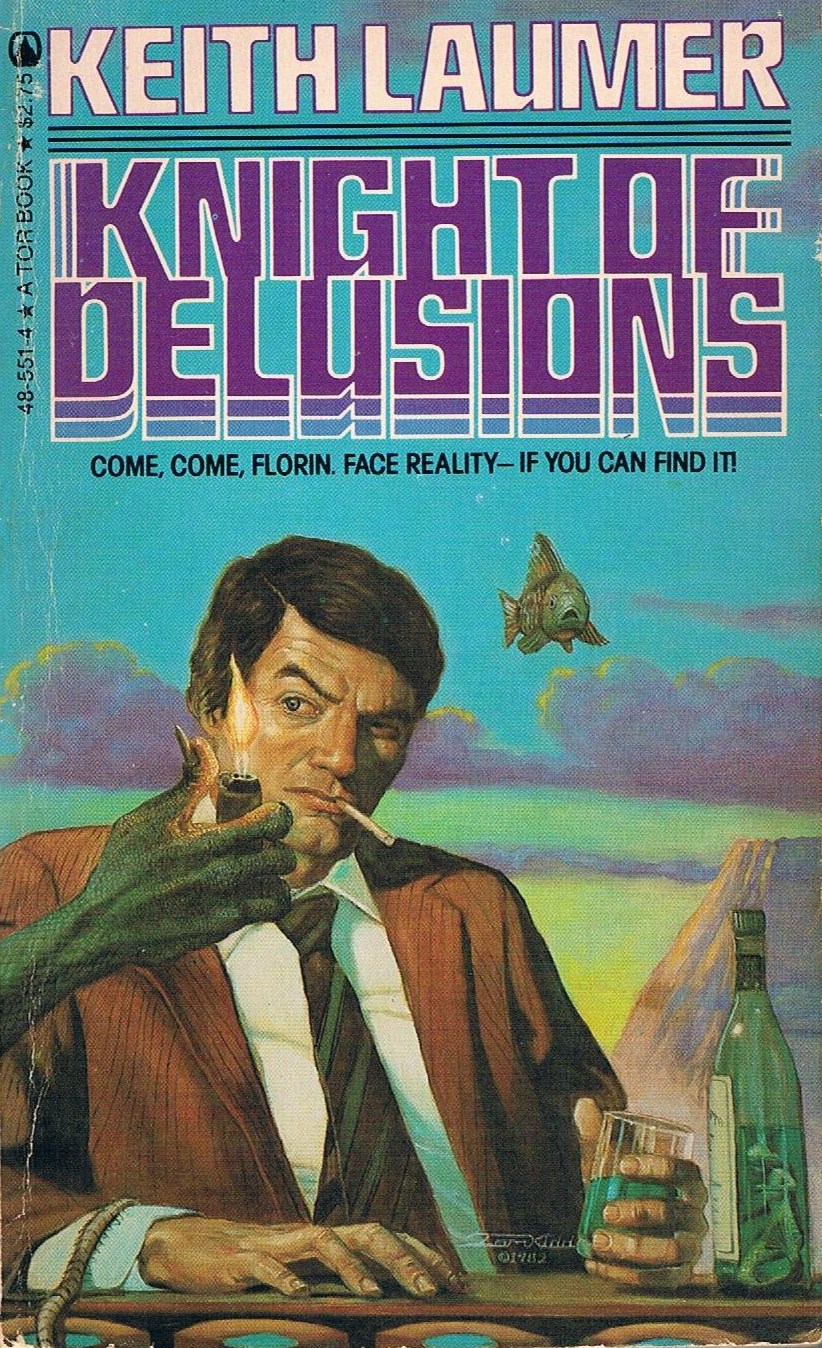
But it's what happens to get him to that point, and what he does afterwards, that make the story unforgettable.
It is done in a sequence of vivid experiences, with dreamlike transitions. Names of people, places, institutions, even numbers crop up repeatedly echoing each other in varied contexts, so that for instance the name "Grayfell" can refer to a summer residence or to a planet, and you don't know which is a dream-reflection of the other.
The storytelling is achieved the only way it could be successfully done - with a style that grounds the fantastic, anchoring each scene in tangible realism.
"Fun's over," I said. "Back, all of you." I jerked a thumb at the connecting door. "Through there."
Bardell advanced, blubbering.
"Listen to me, Florin, you're making a mistake, I was on your side all along, I warned you, remember? I tried to help, did all I could - "
"Shut up," Trait snapped, and he did. "Florin, somehow you've managed to take over the dream machine, and use it against us. I don't claim to know how; I'm just the fellow who follows the wiring diagrams. But Eridani's right: you're tinkering with forces that are too big for you. All right, so you've walled us up in concrete. You've showed what you can do. But you're caught too! The air will start getting foul in a matter of minutes; in a couple of hours, we'll be dead - all of us! So back down now, before it goes too far, before it runs away with you! Get us out of this and I swear we'll make an accommodation with you! We were wrong - "
Poul Anderson, The Corridors of Time (1965); Isaac Asimov, The End of Eternity (1955); Barrington J Bayley, The Fall of Chronopolis (1974); John W Campbell, "Night" (Astounding Stories, October 1935); Philip K Dick, The Game Players of Titan (1963); The Three Stigmata of Palmer Eldritch (1965); Ben Elton, Time and Time Again (2014); Charles L Harness, The Paradox Men (1953); Philip E High, "Routine Exercise" (New Worlds, February 1961); Stephen King, 11.22.63 (2011); Keith Laumer, Knight of Delusions (1982); A E van Vogt, The Weapon Shops of Isher (1951); Michael Moorcock, "Flux" (1963); Jack Williamson, "The Moon Era" (Wonder Stories, February 1932); "Hindsight" (Astounding Science-Fiction, May 1940)
For a variation on the reality-change theme, see The Arc of Iapetus. (More a case of intensified "reality-cultivation", perhaps.)
See Playing Pick-Up Spectra for the extra time-axis used as an analogy in discussion of extra moral dimensions.
For Poul Anderson's The Corridors of Time compared with Barrington Bayley's The Fall of Chronopolis, see Save Jupiter.
See Stapledon, Bester, and rescue by the will for a linkage between automatic and deliberate reality-evolution.
A short tale of limited time-travel without any reality-change: Reconstructions.
For the "tough rubber-band" idea of time being resistant to change see the quotation from Time Patrol commenting on Hawksbill Station, in the Cambrian Period.


























